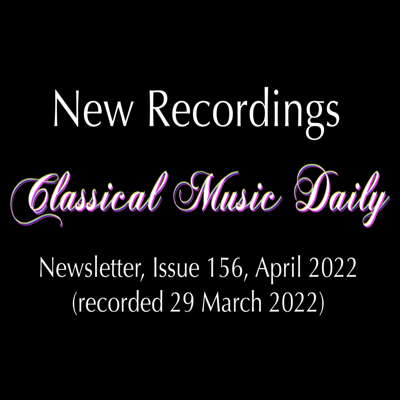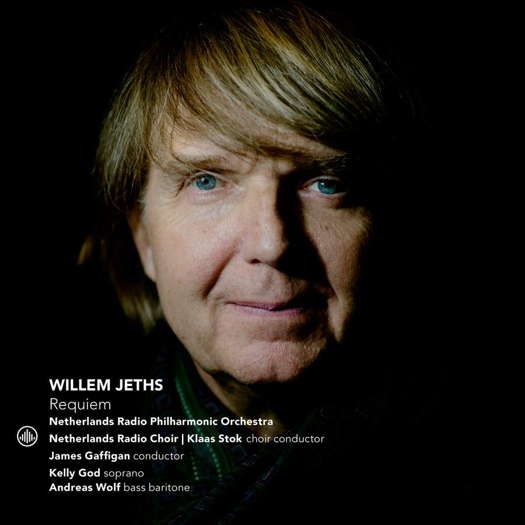 VIDEO PODCAST: New Recordings - Find out about Adrian Williams, Andriy Lehki, African Pianism, Heinrich Schütz and Walter Arlen, and meet Stephen Sutton of Divine Art Recordings, conductor Kenneth Woods, composer Graham Williams and others.
VIDEO PODCAST: New Recordings - Find out about Adrian Williams, Andriy Lehki, African Pianism, Heinrich Schütz and Walter Arlen, and meet Stephen Sutton of Divine Art Recordings, conductor Kenneth Woods, composer Graham Williams and others.

Truly Breathtaking Music
Willem Jeths' Requiem, recommended by GEOFF PEARCE
'Kelly God is phenomenal and James Gaffigan's direction of the very fine forces is inspired.'
This is an absolutely astounding disc and one that I unreservedly recommend to all readers. It is an astonishing performance of this truly breathtaking music and I do not think that it will fail to move anyone who hears it.
Willem Jeths is a composer from The Netherlands, born in 1959, and this Requiem received its world premiere in 2017. Jeths sets the Latin text simply without embellishment from other religious texts, and his forces are modest. There is only double woodwind plus a recorder, strings, brass and rather an extensive array of percussion instruments. He also has two soloists, soprano and baritone, and a mixed choir, and the music lasts just under an hour.
The opening Praefatio starts very quietly, giving a feeling of resignation at the moment of death, but rapidly builds and intensifies into almost a shriek of defiance and dread. This builds to a fantastic climax until it subsides back into a very quiet place, as it starts.
To me, the Introitus hearkens back to an earlier time of plainchant. The choir and orchestra at first seem as if in mourning. The two soloists enter. There is tension and then relaxation in both the choir and soloists, who enter in turn. This is followed by an extensive orchestral episode, impassioned and atmospheric, before subsiding and allowing the soloists and orchestra some beautifully calming moments. This is truly a movement of great power and beauty, and is music that moves me to tears.
Listen — Willem Jeths: Introitus (Requiem)
(track 2, 4:01-4:42) ℗ 2021 Challenge Classics :
The Kyrie is short and there is a dialogue between the baritone soloist and the choir, as there might be in a church service between the priest and the congregation. The orchestra here provides a gentle accompaniment.
The Dies Irae is powerful, stormy and truly quite terrifying. In this movement you also hear an organ, played to quite dramatic effect, strong interjections by the choir and then, at times, an almost eerie quietness. Jeths also employs the recorder and a whistle.
Listen — Willem Jeths: Dies Irae (Requiem)
(track 4, 1:29-2:16) ℗ 2021 Challenge Classics :
The Tuba Mirum is at first quite restrained, but also ominous. The baritone and soprano are the main vocal parts here, and along with the atmospheric orchestration, conjure, for me at least, a feeling for desolation, and at times dread. Brass, as one can imagine, provide a lot of the instrumental writing. The choir comes in towards the end and the organ thunders, until the music subsides to a single held note.
The Rex Tremendae has a lot of contrasting moods, at times tender, then at others stern and powerful.
The Recordare is more subdued, with the soloists intertwining and the choir, after an early interjection, coming in right at the end with a rousing, almost Beethovenian orchestral snippet.
The Lacrimosa is a true lament. The baritone sings a phrase, which is answered by the choir and soprano soloist. This, like most of the movements, is brief. The final entreaty is impassioned.
The Offertorium, scored for choir and orchestra, is impassioned and exultant, yet at the same time, there are moments of terror too as the spectre of Hell is not too far away.
Listen — Willem Jeths: Offertorium (Requiem)
(track 9, 1:00-1:49) ℗ 2021 Challenge Classics :
The Sanctus, a quiet reflection on the glory of God, features a solo soprano backed by light and sparse orchestration, until about half way through an animated choir entry leads to an exulted ending.
The Benedictus follows a similar path to the Sanctus, only this time the vocal soloist is the baritone, the first section is extended and the melody is slightly different.
Listen — Willem Jeths: Benedictus (Requiem)
(track 11, 0:00-0:44) ℗ 2021 Challenge Classics :
The melody and the choral writing that follow the initial baritone entry in the Agnus Dei are obviously derived from early liturgical music. There is a sens of quietness and reflection. The soprano enters with the baritone, and the music is very much in the style of their entry in the Introitus.
I feel that the Lux Aeterna is the spiritual and musical heart of this work. There are moments of great stillness, almost to the point of being static, and a couple of instances where a strong chord appears out of nowhere, almost as if a beam of light suddenly illuminates. This is a movement of great restrained beauty.
Listen — Willem Jeths: Lux Aeterna (Requiem)
(track 13, 6:00-6:45) ℗ 2021 Challenge Classics :
The short Libera Me for unaccompanied choir is a simple and direct entreaty - a serene moment.
The In Paradisum begins very atmospherically with solo recorder and celeste, before the choir, and a few moments later the baritone and then the soprano, enter and overlap. Then the massed forces of the choir, orchestra and soloists enter rapturously. One can truly imagine entering paradise at this point. One gets a sense that death has indeed just been part of the journey from one phase of our existence to the next. This is the Requiem's most beautiful movement.
Listen — Willem Jeths: In Paradisum (Requiem)
(track 15, 1:45-2:30) ℗ 2021 Challenge Classics :
This is one of the greatest works I have heard, and I feel that future generations will also regard it so. The performance on this recording, by all the forces involved, is breathtaking and inspired. The soloists are magnificent, although there are times when I wish baritone Andreas Wolf, who is an excellent singer, would perhaps vary his somewhat fast vibrato, but this is just a minor quibble and not to detract from his excellent role. Kelly God is phenomenal and James Gaffigan's direction of the very fine forces of the Netherlands Radio Philharmonic Orchestra and Netherlands Radio Choir is inspired. This disc truly is a must have.
Copyright © 5 June 2021
Geoff Pearce,
Sydney, Australia

CD INFORMATION - WILLEM JETHS: REQUIEM
MORE CONTEMPORARY MUSIC ARTICLES
MORE NETHERLANDS CLASSICAL MUSIC ARTICLES




